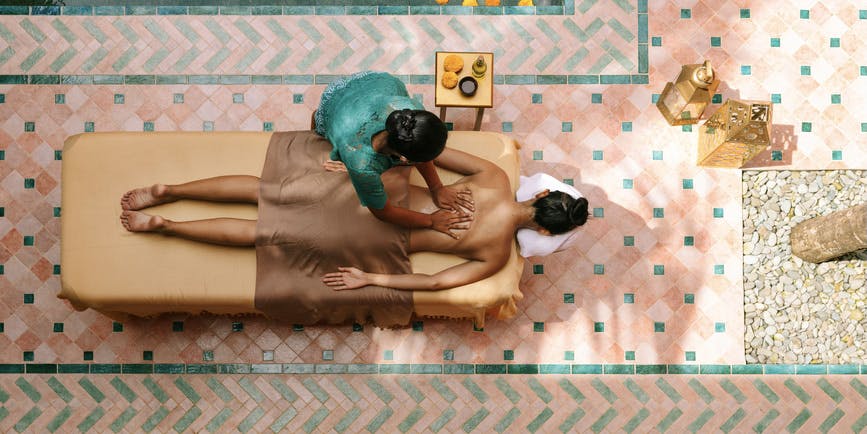The 411 on whole-body medical massage benefits

Topics
Some people consider massages an elite indulgence. Others argue they're a vital part of whole-body health.
This week, we review the science-backed benefits of three areas of medical massage: vagus nerve stimulation, lymphatic drainage + gua sha. Then keep scrolling for an important Covid-19 heart risk update + other vital health news. But first, it’s time to get...
- The Checkup: moving + monitoring
- Knead It: medical massage benefits
- Healthcare: Covid-19 + STDs + $$$
The Checkup
- Don’t do these (obviously) rude things when at the spa
- Get the 411 + protect yourself against rising variant EG.5
- And here’s more on why Covid-19 is (still) an equity issue
- Try this 5-step face massage to help relieve sinus pressure
- Listen to a fascinating, uplifting story about AI + depression
- What to consider before soaking your produce in baking soda
- Too much, too little, too bloody + other saliva warning signs
- Turns out 4,000 steps is the magic number for delaying death
- If it’s not brutally hot, try this 20-minute circuit workout outside
Vagus nerve stimulation

Smart people describe the vagus nerve as an information superhighway between our brain + gut. It's how we feel butterflies in our stomach when excited or scared—our brain tells our gut muscles to contract. It also tells our parasympathetic nervous system to trigger our rest + digest sleep sequence.
But if this connection gets thrown off? We may feel overstimulated or not fully restore.
Research suggests that stimulating the vagus nerve (via electric massage) may release neurotransmitters like serotonin + activate the area of the brain that helps us control emotion. This may prove a vital treatment for people with some kinds of depression and those with health conditions including epilepsy, arthritis + Crohn's disease.
Insurance has yet to cover it. But don’t be surprised if at-home stimulation tutorials start to flood your feeds. Learn more at Scientific American.
What's the deal with lymphatic massage?!

Lymphocytes are a type of white blood cell that live in glands + tissues around our body. They carry fluid from our tissues into veins and swell with antibodies to attack bacteria + viruses. (That's why our glands feel tender when fighting a cold.)
Sensitive to gravity, they can pool fluid around our face, feet + other body parts, making us feel bloated + creaky. Fortunately, manual lymphatic drainage can stimulate lymph nodes and help move lymphatic fluid.
This targeted massage therapy gently presses and scrapes skin in specific motions. Simulating the lymphatic system will revive movement for anyone that feels puffy after a night out. But it’s especially beneficial for post-surgery patients + those with cancer or inflammatory conditions.
Learn more at The Conversation.
Can gua sha reduce the puff?!

Stress, cocktails + salty foods can make a morning face extra puffy, amiright? Which is how gua sha became a viral beauty hack stateside.
Rooted in a Chinese massage technique that improves circulation, gua sha involves scraping the face, head and neck in specific, smooth + gentle motions to relax lymph nodes + move fluid. Dermatologists warn it's a short-term solution + not a replacement for anti-aging treatments (like Botox). But with few adverse side effects, it can help smooth fine lines and accentuate facial muscles. And similar forms of skin scraping have been used for athlete recovery + pain management for centuries!
Learn more at Cosmo + check out this 1-minute face massage tutorial.
Healthcare 411
Covid-19's impact on heart health still confounds doctors (Time). Even a mild Covid-19 infection increases risk of blood clots, irregular heartbeats + heart attack for a year. Those who’ve had Covid-19 are twice as likely to seek medical help for cardiovascular problems. And heart attacks increased by 30% in those ages 25-44 between 2020-2022. Read the article for what we know—and don't know—about this connection.
STIs are on the rise in the US. A pill taken after sex could help slow them down (CNN). Research suggests that one 200mg dose of Doxycycline taken within 72 hours of unprotected sex can help reduce chlamydia, gonorrhea and syphilis infections by 65%. (This is specific for those with penises.) STD rates continue to rise in the US. So the CDC is considering formal guidelines for this doxyPEP approach.
Getting clear prices for hospital care could get easier under a proposed rule (NPR). Hospitals + insurance companies must legally share all medical costs with patients before treatment. But many only provide estimates, offering little patient benefit. New proposed rules will standardize data reporting + posting on websites, making it easier to find + compare. It will also require hospitals to share insurance company reimbursement.
Topics
Sign up for the free Dr. B newsletter for a weekly report on the latest in healthcare + research-based advice for staying healthy and mentally well.